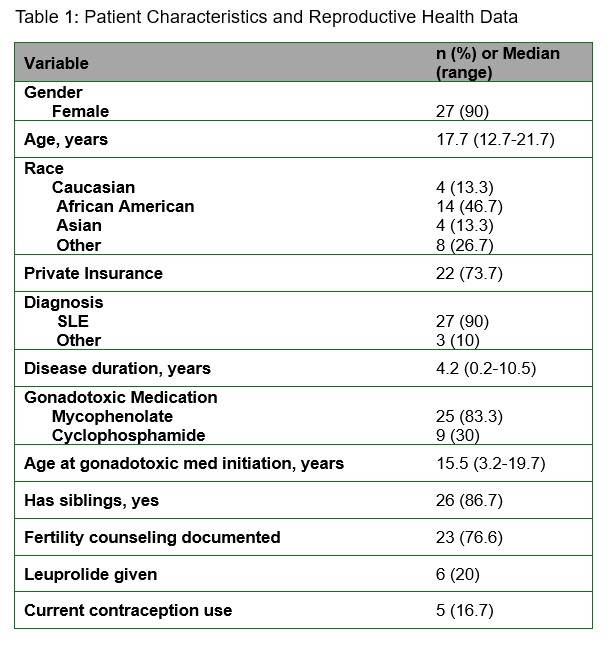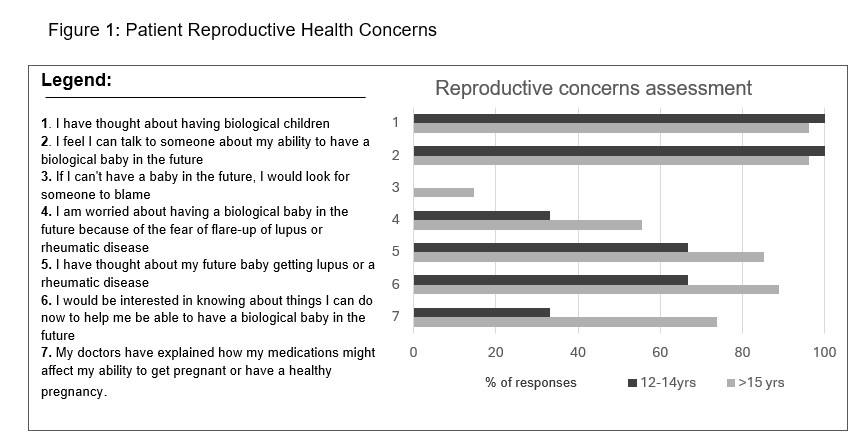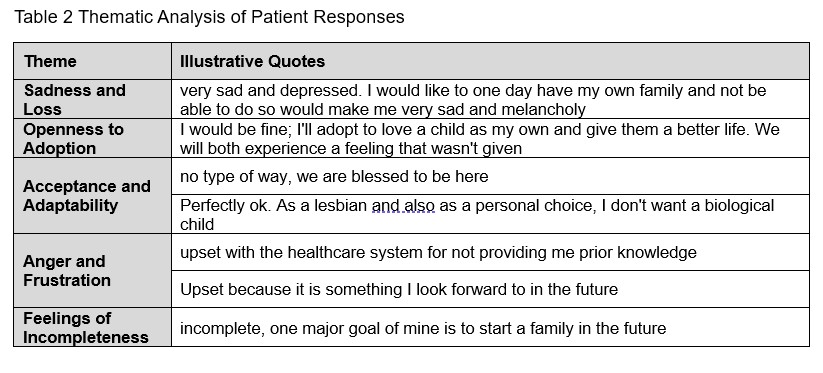Session Information
Session Type: Poster Session C
Session Time: 10:30AM-12:30PM
Background/Purpose: Adolescents and young adults diagnosed with rheumatic diseases often require treatment with teratogenic and cytotoxic medications to effectively manage their conditions. While these therapies are crucial to treat life and organ-threatening conditions, they may cause premature gonadal failure, future infertility, or increase the risk of adverse pregnancy outcomes. Cancer patients receive similar treatments and research in the pediatric oncology population has shown that concerns about fertility significantly impact their health-related quality of life (HRQOL). This has never been evaluated in pediatric rheumatology patients, despite the shared use of cytotoxic medications. Understanding rheumatologic patient perspectives on fertility-related issues and their knowledge of preservation options is essential for comprehensive care. The primary objective of this study was to identify fertility concerns by conducting assessments of patient attitudes toward fertility in adolescents diagnosed with rheumatic diseases previously exposed to cytotoxic medications.
Methods: We conducted a prospective survey-based psychometric descriptive study for eligible pediatric patients in the rheumatology clinic who had received cyclophosphamide or mycophenolate treatment. The survey was based on a validated HRQOL survey designed to assess fertility concerns and desires for future parenthood in adolescent oncology patients. Two survey versions were provided to different age groups (12-14 years and over 15 years). Relevant data were collected from the electronic health record (EHR). Survey results were analyzed using descriptive statistics.
Results: A total of 30 patients participated, with 27 being above the age of 15 (Table 1). Most patients in both age groups expressed a desire to have biological children. Counseling about infertility was reported by approximately 70% (21) of patients, with EHR review indicating documentation of counseling for 77% (23) of patients, suggesting close accuracy in counseling documentation. Fertility preservation measures were not pursued in any of our patients. Survey results of reproductive health concerns are presented in Figure 1. There were no differences noted between males and females. Over 90% of patients above the age of 15 expressed a preference for their reproductive health-related concerns to be addressed by their physician. Qualitative analysis of free-text responses regarding feelings associated with potential infertility revealed several key themes, underscoring the emotional and psychological impact of fertility concerns, as summarized in Table 2.
Conclusion: Fertility concerns are prevalent among patients undergoing treatment for rheumatic diseases, yet counseling and preservation measures may be underutilized. Addressing these concerns through education, counseling, and support for fertility preservation could mitigate distress and enhance the quality of life for these patients. Further research could focus on developing targeted interventions including creating standardized guidelines for healthcare providers, increasing accessibility to fertility preservation options, and integrating multidisciplinary approaches to care.
To cite this abstract in AMA style:
FARAJALLAH S, Dunnock K, Yu Q, Sule S, Ronis T. Fertility Concerns in Adolescents and Young Adults Receiving Gonadotoxic Medications for Rheumatic Disease [abstract]. Arthritis Rheumatol. 2024; 76 (suppl 9). https://acrabstracts.org/abstract/fertility-concerns-in-adolescents-and-young-adults-receiving-gonadotoxic-medications-for-rheumatic-disease/. Accessed .« Back to ACR Convergence 2024
ACR Meeting Abstracts - https://acrabstracts.org/abstract/fertility-concerns-in-adolescents-and-young-adults-receiving-gonadotoxic-medications-for-rheumatic-disease/



